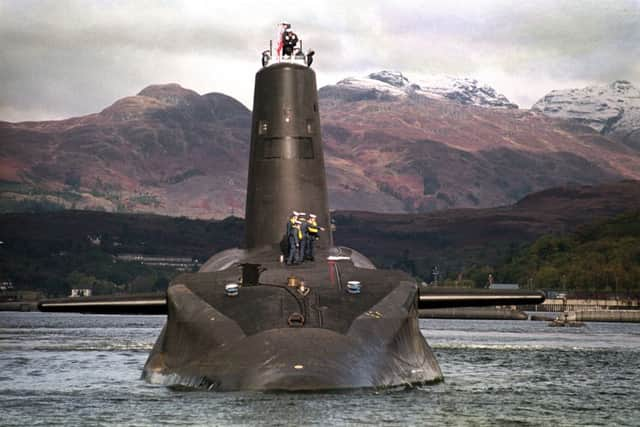Trident ‘disaster waiting to happen’ claims probed


Able Seaman William McNeilly, 25, criticised measures in place around the Trident submarine programme, describing it as a “disaster waiting to happen”.
In an online post he said he is an Engineering Technician Submariner who was on patrol with HMS Victorious this year.
Advertisement
Hide AdAdvertisement
Hide AdHe claimed there are fire risks and leaks on board and that security checks are rarely carried out on personnel and contractors working on the submarines when they are docked at Faslane.
The Royal Navy confirmed Mr McNeilly is a member of the naval service and said it was “concerned for his whereabouts and wellbeing”. The Navy said many of the claims are “subjective and unsubstantiated personal views, made by a very junior sailor, with which the naval service completely disagrees”.
Mr McNeilly said he raised concerns with senior officers but decided to publish his claims as they were ignored.
A Royal Navy spokeswoman said: “The Royal Navy takes security and nuclear safety extremely seriously and we are fully investigating both the issue of the unauthorised release of this document and its contents.
“The naval service operates its submarine fleet under the most stringent safety regime and submarines do not go to sea unless they are completely safe to do so.”
A statement added: “The Navy is concerned for the whereabouts and wellbeing of able seaman McNeilly and is working closely with civilian police to locate him.”
Mr McNeilly, who is from Netownabbey near Belfast, says he joined the Navy in July 2013 and arrived at Faslane a year ago.
He wrote at the weekend: “The penalty for releasing this report will be life prison if I’m lucky.
Advertisement
Hide AdAdvertisement
Hide Ad“The worst fear for me isn’t prison... it’s the fear of sacrificing everything I have just to warn the public and yet never be heard. When I’m found I will confess and will no longer be able to keep trying to warn the public.”
Experts speculated that while McNeilly may be credible, he may also have misunderstood some of the things he saw.
Peter Burt, of the nuclear disarmament group the Nuclear Information Service, however, said he was a “brave young man”.
“William McNeilly has done not only his colleagues in the submarine service but the whole nation a service by exposing the risks that submariners face because of cost-cutting, staff shortages and lax management.
“The Ministry of Defence’s nuclear programme operates to far lower safety standards than
the civil nuclear sector because independent regulators are not allowed to scrutinise its activities, and because much is covered up under the pretence of security.
“This must now stop, and the Prime Minister must order an immediate reform of military nuclear safety.”